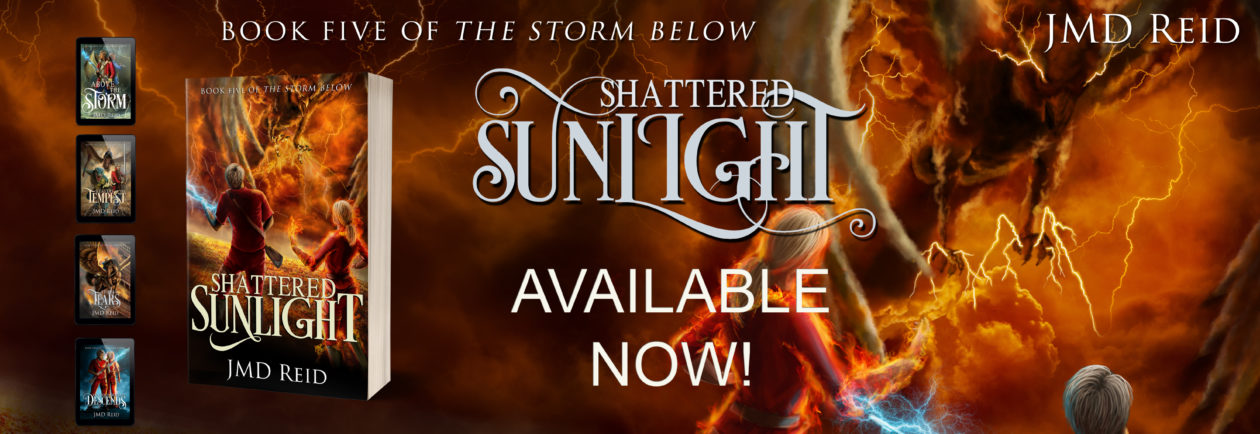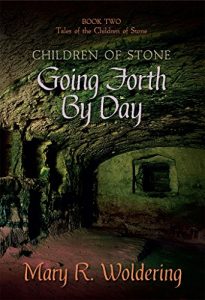Reread of Prince of Nothing Trilogy
Book 1: The Darkness that Comes Before
by R. Scott Bakker
Part 4
The Warrior
Chapter 14
The Kyranae Plain
Welcome to Chapter Fourteen of my reread. Click here if you missed Chapter Twelve!
Some say men continually war against circumstances, but I say they perpetually flee. What are the works of men if not a momentary respite, a hiding place soon to be discovered by catastrophe? Life is endless flight before the hunter we call the world.
—Ekyannus VIII, 111 Aphorisms
My Thoughts
Isn’t that they way of life. Trying to get ahead on bills. Worrying when the next problem is going to happen: the car break down, injury, or losing your job. Just when you think everything is fine then, bam! Of course, it also speaks to Cnaiür, Serwë, and Kellhus fleeing the Kidruhil in this chapter in a very literal sense.
Spring, 4111 Year-of-the-Tusk, the Nansur Empire
Cnaiür and Kellhus have started to travel at night across the Nansur Empire. For the first time, Serwë wakes up in the afternoon sleeping next to Kellhus. He had resisted her joining his sleeping mat for a while, but this morning had relented. Serwë enjoys the feel of Kellhus sleeping form against hers and marvels at how much she loves him and how he loves her despite her past.
Cnaiür is up and washing in a stream and Serwë watches him and fells no fear for the fist time, just pity at his loneliness. She notices a boy on the other side of the river and in her mind pleads with the boy to run. Kellhus, awake, whispers to Cnaiür in Scylvendi. Cnaiür sees the boy, and tells him to come close. Serwë yells at the boy to run and begs with Kellhus to spare the boy as Cnaiür chases him. Kellhus followed Cnaiür and Serwë realizes he also means to kill the child. Serwë follows.
As Serwë follows, it occurs to her she is no fugitive in the Nansur. This is her home and and she would not have to suffer Cnaiür anymore. However, she thinks on how Kellhus loves her, the first, and returning to the Empire would just mean more Gaunum wives and more blue babies. Serwë is pregnant and has convinced herself it is Kellhus’s child.
Serwë has lost Cnaiür and Kellhus and can’t locate the camp. She hears horses and believes it’s Kellhus come looking for her but instead runs across two Kidruhil cavalry of the Imperial Army. She is fearful, thinking the Kidruhil have been warned by the boy and that Kellhus may be dead because of her.
The older of the two Kidruhil sees her fear and thinks Serwë must be “with them.” The pair of soldiers argue, the younger saying they don’t have time for this while they older says there’s always time for sport with a girl as pretty as Serwë. The man advances on her and she begs for him to spare her. The man drives his dagger into the ground as he begins to grope her.
There is a sound, and the younger man is decapitated by Cnaiür. Cnaiür asks Serwë if she was hurt, and the scarred Kidruhil begins to beg to Cnaiür, apologizing for touching Serwë.
The officer moved away from Serwë, as though to disassociate himself from his crime. “C-come now, friend. Hmm? T-take the horses. All y-yours—”
To Serwë it seemed that she’d floated to her feet, that she’d flown at the scarred man, and that the knife had simply appeared in the side of his neck. Only his frantic backhand knocked her back to earth.
She watched him fall to his knees, his bewildered hands fumbling at his neck. He threw an arm backward, as though to ease his descent, but he toppled, lifting his back and hips from the ground, kicking up leaves with one foot. He turned to her, retching blood, his eyes round and shining. Begging her. . .
Cnaiür grabs Serwë and places the knife she killed the Kidruhil at her temple. She begs for her life and Cnaiür warns her never to betray them again or he will kill her. Then Cnaiür cuts her forearm, giving her a swazond, the ritual scaring of the Sclyvendi for kill the Kidruhil and calls her by name for the first time.
“I don’t understand,” Serwë whimpered, as bewildered as she was terrified. Why was he doing this? Was this his punishment? Why had he called her by name?
You must suffer him . . .
“You are my prize, Serwë. My tribe.”
Cnaiür and Serwë find Kellhus at camp and she raced to him and hugs him fiercely and he comforts her as she cries like a father. Kellhus confronts Cnaiür and tells him that Serwë is no longer his prize. Cnaiür laughs, and says more Kidruhil come, we have killed only a dozen out of fifty. Serwë apologizes to Kellhus for warning the boy.
Cnaiür laughs, and says the boy warned know one. “What mere boy could escape a Dûnyain?” Serwë is horrified and looks at Kellhus. She sees grief welling in his eyes and she feels shame, forcing Kellhus to commit this crime. Cnaiür announced they will ride the Kidruhil horses to death first.
For two days, the trio had eluded the Kidruhil thanks to the forest and Cnaiür’s skill. Serwë find the next two days an ordeal. At the end of the second day, Cnaiür thinks they may have lost the Kidruhil and they make camp. Cnaiür explains that the Kidruhil would think they went west, like any raiding party would after making contact with the Kidruhil. If they found their trail heading east, the Kidruhil would think it a ruse.
They ate a meal of raw fish, and Cnaiür explains they are safest in the western provinces, long abandoned because of Scylvendi raids. Once they cross the Phayus River, it will be a different matter. Serwë wonders why these two would risk this journey. The next day as they traveled, Serwë finds herself hungry. At midday, Kellhus stops and asks her is she’s hungry.
“How do you know these things?” she asked. It never ceased to thrill her each time Kellhus guessed her thoughts, and the part of her that held him in reverent awe would find further confirmation.
“How long has it been, Serwë?”
“How long has what been?” she asked, suddenly fearful.
“Since you’ve been with child.”
But it’s your child, Kellhus! Yours!
“But we’ve not yet coupled,” he said gently.
Serwë suddenly felt bewildered, unsure as to what he meant, and more unsure still whether she had spoken aloud. But of course they had coupled. She was with child, wasn’t she? Who else could be his father?
Serwë starts to cry and Kellhus apologizes and tells her they will eat soon. Kellhus rides up to talk with Cnaiür and Serwë studies Kellhus and realizes she didn’t speak and he sill knew her thoughts and she begins to think he is a God. She remembers in the time of the Tusk, the Gods communing with Men. Serwë begins to think that her beauty was given her because one day her betrothed, a God, would arrive.
Anasûrimbor Kellhus.
She smiled tears of rapturous joy. She could see him as he truly was now, radiant with otherworldly light, haloes like golden discs shining about his hands. She could see him!
Later, as they chewed strips of raw venison in a breezy stand of poplars, he turned to her and in her native tongue of Nymbricani said, “You understand.”
Serwë nods, and answers that she is to be Kellhus’s wife, and Kellhus promises her that it will be soon.
That afternoon, after crossing a valley, they catch glimpse of pursuers. Cnaiür leads them on, telling the group that these pursuers will not stop till they hunt them down. Their only advantage is reaching the plains ahead and using their extra mounts by running them to death and reach the Holy War ahead of their pursuers.
They ride until it is too dark to see, then lead their horses on foot. Serwë finds the pace almost more than she can handle. At dawn, they are able to ride their horses again and gallop over pastures. Serwë finds it exhilarating. They enter cultivated lands, passing slaves working in fields and small villas were minor nobles lived. They rode down roads know, passing teamsters who cursed at them and forcing people to dive out of their way or be trampled.
At mid-afternoon, they stop and Serwë falls off her horse in exhaustion. Cnaiür curses and Serwë looks behind them to see a dust cloud trailing them. Cnaiür asks Kellhus what he sees, and Kellhus says the same sixty-eight men, except know they have different horses. Cnaiür didn’t expect them to get remounts and asks Kellhus if they could take them at night. Kellhus is unsure, but says they should press their lead and continue riding.
They continue riding into twilight when Serwë’s horse, “her prize for having killed the scarred man” dies and she falls hard to the ground. Cnaiür urges them to abandon Serwë. To their pursuers she’s just stolen property. Kellhus, however, will not leave her.
“This is not like you, Dûnyain… Not like you at all.”
“Perhaps,” she heard Kellhus say, his voice now very close and very gentle. Hands cupped her cheeks.
Kellhus . . . No blue babies.
No blue babies, Serwë. Our child will be pink and alive.
“But she’ll be safer—”
Darkness, and dreams of a great, shadowy race across heathen lands.
Serwë regains conscience on Kellhus’s horse, her hands tied around his waist. The three are still being chased. She looks around and realizes they have no spare mounts and the Kidruhil were closer. Cnaiür cries out a warning, as another group of horseman force the three to ride up a hill.
Three horseman erupt from some trees to intercept them, one felled by Cnaiür’s bow. A second hurls a javelin at Kellhus who easily catches it out of the air and throws it back, killing the man. The third raised a sword and prepared to attack Kellhus, but was disemboweled by the faster Dûnyain.
At the top of the hill, they find a sharp drop and abandon the horses and they skid down the drop. At the bottom, Serwë hits hard and is surprised by Cnaiür concern when he gently helps her up and asks if she’s fine. Kellhus is the last down and reports that they won’t follow them down the slope. Cnaiür fears that others have already started to go around the hill and Serwë begins to panic because they have no horses, now.
Kellhus knelt before her, his heavenly face blotting out the sun. Once again she could see his halo, the shimmering gold that marked him apart from all other men. He’ll save us! Don’t worry, my sweet, I know He will!
But he said, “Serwë, when they come, I want you to close your eyes.”
“But you’re the promise,” she said, sobbing.
Kellhus brushed her cheek, then wordlessly withdrew to take his place at the Scylvendi’s side. She glimpsed flashes of movement beyond them, heard the neigh and snort of fierce warhorses.
A group of horseman, not Kidruhil, burst out of brush and surround them. Each wore mail skirts and had white-and-blue surcoats. Silver war masks cover their faces and Serwë thinks these men are here to save them, “to shelter the promise.” The leader identifies himself as Krijates Iryssas, one of Xinemus’s knights. Iryssas asks, “Have you seen any fugitive criminals about?”
Stunned silence. At last Cnaiür said, “Why do you ask?”
The knight looked askance at his comrades then leaned forward in his saddle. His eyes twinkled. “Because I’m dying for the lack of honest conversation.”
The Scylvendi smiled.
My Thoughts
Serwë has a moment of peace with Kellhus. It seems like Serwë’s lot is improving slightly with Kellhus taking an interest. Sadly, Serwë is suffering some serious Stockholm Syndrome here. She’s even starting to feel pity for Cnaiür.
So, Serwë is pregnant and thinks Kellhus is the father even though this morning was they only time they’ve shared a bed and they didn’t even have sex. Serwë is delusional, but I don’t blame her for wanting the man she loves to be the father than her rapist.
I am wondering how long they’ve been traveling. It doesn’t seem more than a week or two since she was captured. She might just now be missing her period. Seems a little early for her to jump to pregnancy just yet. Unless they’ve been traveling longer.
Gah! Just when she’s thinking she’ll be fine if anyone from the Empire finds her, they do and try to rape her. Their is a great amount irony of Cnaiür, her rapist, asking if the other rapist hurt her. Cnaiür is a dick.
Go Serwë! Stab that asshole. Great description here. The shock hasn’t worn off and she just finds herself killing the guy. By killing the Kidruhil, Cnaiür seems to think of Serwë as Scylvendi now. Its like in his mind she’s one of his wives know. Didn’t know women in Scylvendi could get a swazond. But then, Cnaiür does think outside of the norm for a Scylvendi. I do want to draw attention to what Cnaiür says about the swazond:
“The man you have killed is gone from the world, Serwë. He exists only here, a scar upon your arm. It is the mark of his absence, of all the ways his soul will not move, and all the acts he will not commit. A mark of the weight you now bear.”
In light of what we learn in The Great Ordeal about the gods, damnation, and souls, this is a very interesting statement. I won’t say more, but try to remember it when you get to the end of The Great Ordeal and what is seen in through the Judging Eye. It might answer why the person seen is damned more than other men.
Kellhus can even cry on demand. Poor Serwë, now she feels guilty for forcing Kellhus to kill the boy. Don’t, Serwë, don’t. You gave the boy a chance to live, don’t feel guilty about that. You were the only decent human at that camp. Don’t let the Dûnyain take that away from you.
Serwë is amazed that she could not only eat raw fish, but enjoy it. Hunger is the best seasoning, they say. She is a resilient character. She doesn’t complain when she’s hungry, she does her best to keep up. She thinks she is weak, but I see strength in her.
And Serwë now thinks Kellhus is a God. And why not, he seems to read her mind, he’s kind to her. She has contextualized her years of rape and suffering as preparing her for the arrival of Kellhus. Why else was she given the gift to be so beautiful that every man who comes across her, wants her. “She was also something too beautiful for the world.” So convinced is she, that halos appear about his hands. And Kellhus allows this delusion to continue because it most benefit him. Can’t blame Serwë, though. Who doesn’t want to think that their suffering mattered, that all that pain wasn’t in vain.
Kellhus doesn’t want to abandon Serwë, even though it would increase his and Cnaiür chance of success. It’s hard to say what’s going through Kellhus mind right now. He must see some greater advantage with Serwë, unless seeing her tormented night after night by Cnaiür has actually affected him. He was stirred to some emotion in the last chapter and was surprised by it. I’m siding with seeing a greater advantage. After all, she has proven very useful in dealing with Cnaiür. Kellhus is seeing how men view Serwë. And, as we’ll see, Kellhus will use that over and over again.
Don’t know if its Serwë’s concussion or delusion (probably both) that makes her think Kellhus is communicating in her mind with the “our baby will be born pink and alive.”
Kellhus comforts Serwë, an unnecessary thing to do. I think pity has moved Kellhus. Even a Dûnyain doesn’t see a way out of their predicament. There’s just too many hunters. And then they are saved by Xinemus’s men. Even by proxy, Xinemus continues to be awesome. This was quite an exciting chapter. Luckily for them, the Man of the Tusk really hate the Nansur Empire.


